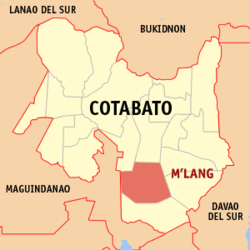M'lang, Cotabato
| M'lang | ||
|---|---|---|
| Municipality | ||
|
||
 Map of Cotabato with M'lang highlighted |
||
| Location within the Philippines | ||
| Coordinates: 6°57′N 124°53′E / 6.95°N 124.88°ECoordinates: 6°57′N 124°53′E / 6.95°N 124.88°E | ||
| Country | Philippines | |
| Region | SOCCSKSARGEN (Region XII) | |
| Province | Cotabato | |
| District | 3rd District of Cotabato | |
| Incorporated | August 3, 1951 | |
| Barangays | 37 | |
| Government | ||
| • Mayor | Russel Abonado | |
| Area | ||
| • Total | 312.13 km2 (120.51 sq mi) | |
| Population (2015 census) | ||
| • Total | 95,070 | |
| • Density | 300/km2 (790/sq mi) | |
| Demonym(s) | Mlangeños | |
| Time zone | PST (UTC+8) | |
| ZIP code | 9402 | |
| IDD : area code | +63 (0)64 | |
| Income class | 1st municipal income class | |
| 124710000 | ||
| Electorate | 49,957 voters (2016) | |
| Website | www |
|
M'lang (Hiligaynon: Banwa sang M'lang; Filipino: Bayan ng M'lang) is a first class Municipality in the Province of Cotabato, Philippines. According to the 2015 census, it has a population of 95,070 people.
M'lang is politically subdivided into 37 Barangays.
The Name M'lang was derived from a Maguindanaoan word Tamlang which means "bamboo".
In 1930's Migrants From Visayas (Panay) and some parts of Luzon settled in M'lang. Jacinto Paclibar, who was in search for more fertile lands and vast settlement was the first Christian who settled in M'lang. He became the District Mayor of Kidapawan and Deputy Governor of the Empire Province of Cotabato under Datu Udtog Matalam.He had in mind a government assisted subdivision project so that landless settlers may have their share to utilize fertile lands for farming and settlement.
M'lang became regular Municipality on August 3, 1951, by virtue of Executive Order No. 462 of the President of the Philippines by the then President Elpidio Quirino, with territories taken from the adjacent towns of Kidapawan (its mother municipality) and Buluan of the now Maguindanao Province.
In the 2015 census, the population of M'lang was 95,070 people, with a density of 300 inhabitants per square kilometre or 780 inhabitants per square mile.
The North Cotabato Rural Airport, in barangay of Tawan-tawan, is intended to serve as the primary air transport hub for agricultural produce of Cotabato and those coming from central Mindanao. It has a 1.2 kilometer runway with a capability for commercial flights, but there are no scheduled flights.
...
Wikipedia


